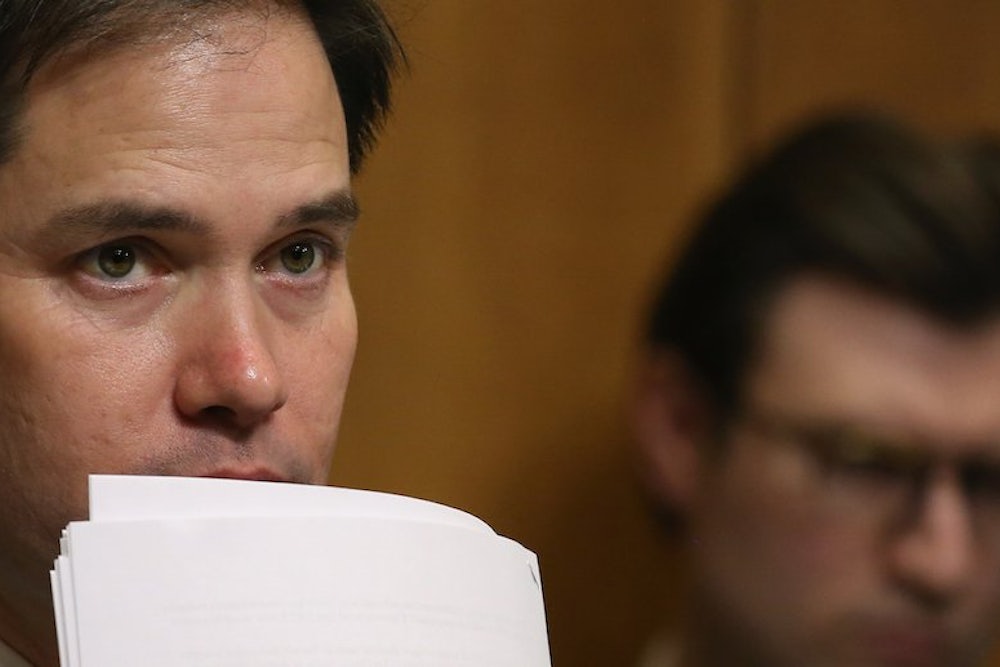Most of the Republican Party’s primary candidates have internalized something that was blindingly obvious to everyone who watched the 2012 elections unfold. So long as traditional turnout patterns hold, Republicans can’t keep up with Democrats in presidential contests. To win, they need to alter the turnout pattern, and to alter the turnout pattern, they need to break with GOP orthodoxy in some way.
Jeb Bush is jilting the conservative movement by swearing off red meat, hoping an even temperament will appeal to uncommitted voters. Senator Rand Paul is courting young and minority voters by promising to challenge the surveillance and carceral states.
Senator Marco Rubio, who will announce his candidacy for president on Monday, was supposed to lead a GOP breakaway faction in support of comprehensive immigration reform, but was unable to persuade House Republicans to ignore the nativist right, and the whole thing blew up in his face. In regrouping, he’s determined that the key to restoring Republican viability in presidential elections is to woo middle class voters with fiscal policies that challenge conservative orthodoxy.
His new basic insight is correct. The GOP’s obsession with distributing resources up the income scale is the single biggest factor impeding it from reaching new constituencies, both because it reflects unpopular values and because it makes them unable to address emerging national needs that require spending money.
It also happens to be the raison d’être of the conservative establishment. Challenging the right’s commitment to lowering taxes on high earners, and reducing transfers to the poor and working classes, will encounter vast resistance. Where Paul can appeal to the moral and religious sensibilities of elderly whites who might otherwise oppose criminal justice reforms, a real challenge to GOP fiscal orthodoxy will get no quarter from GOP donors.
If Rubio were both serious and talented enough to move his party away from its most inhibiting orthodoxy, in defiance of those donors, his candidacy would represent a watershed. His appeal to constituencies outside of the GOP base would be both sincere and persuasive.
But Rubio is not that politician. He is no likelier to succeed at persuading Republican supply-siders to reimagine their fiscal priorities than he was at persuading nativists to support a citizenship guarantee for unauthorized immigrants. In fact, nobody understands the obstacles facing Marco Rubio better than Marco Rubio. But rather than abandon his reformist pretensions, or advance them knowing he will ultimately lose, Rubio has chosen to claim the mantle of reform and surrender to the right simultaneously—to make promises to nontraditional voters he knows he can’t keep. My colleague Danny Vinik proposes that Rubio wants to "improve the lives of poor Americans" but he must "tailor [his] solutions to gain substantial support in the GOP, and those compromises would cause more harm to the poor." I think this makes Rubio the most disingenuous candidate in the field.
Nothing captures Rubio’s irreconcilable commitments quite like the evolution of his plan to reform the tax code. From the outset, Rubio never intended to sideline the interests of the wealthy. As originally conceived, his tax plan would’ve paired modest middle class benefits with very large tax cuts for high earners, much like George W. Bush’s first big tax cut in 2001. But when conservatives voiced dissatisfaction with that particular distribution, Rubio responded not by telling them to buzz off, or by eliminating the middle-income benefits and plying the savings into further high-end tax cuts. He kept the benefits, and layered hugely regressive additional tax cuts for the wealthy on top of an already unaffordable plan. What once would have increased deficits by $2.4 trillion over a decade, according to the Tax Policy Center, would now increase them by trillions more. The beneficiaries would be investors, who would no longer pay any tax on capital gains and dividends, and wealthy families, whose enormous bequests would be subject to no tax either.
Unbelievably, this play to have it both ways still doesn’t satisfy supply-siders. “This business side of the plan is pretty darn good and I like it,” Larry Kudlow told Politico’s Ben White. “The personal side of it is a mess and will be politically and economically indefensible and he is going to take tremendous criticism for it and my guess is he will have to back off it very fast.”
That a Republican’s tax math doesn’t add up is nothing new in politics. But most Republicans brush off the shortfalls with vague promises to make huge reductions in social spending. That’s what Mitt Romney did, and what Paul Ryan did back when he chaired the House budget committee. This didn’t put them on the level, but it helped complete a picture—that cutting taxes was a higher priority to them than supporting lower and middle class incomes. Rubio, by contrast, says he will hold anti-poverty spending flat. Now that Ryan is no longer responsible for writing Republican budgets, and doesn’t have to reconcile his incompatible priorities, he also claims he wants to hold anti-poverty spending flat. Rubio isn’t so lucky. As a presidential candidate, he, unlike Ryan, will be held to account for all of his tax and spending proposals.
Either Rubio is promising to run up bigger deficits than any president in history, or he’s swindling someone. Upper income tax cuts, middle class tax credits, anti-poverty spending—at least one of these will have to give. The experience of watching his tax plan evolve tells us a great deal about which one won’t.
